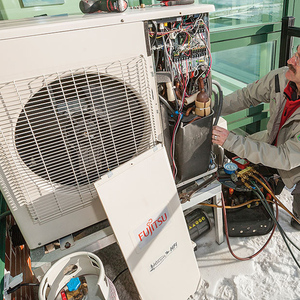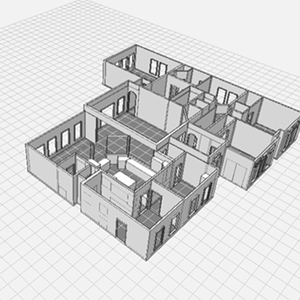What are the minimum requirements in a house to get a certificate of occupancy? The reason I’m asking is that we plan to finish most of the interior ourselves, and we won’t have a mortgate (so no bank involved.) Does it depend on the state? (NH) or the town? (Webster) or what?
Thanks,
Dot



















Replies
In Mass it is left to the BI & he will usually issue based on there being at least 2 means of egress, smoke alarms, sanitary facilities and whatever he deems necessary for the building to be safe (sliders blocked if the deck isn't complete). Some may require the kitchen complete.
arounf here. everything thats in the wall must be finished, no open walls, all electrical. hvac complete. a working kitcern and one working bathroom. really only thing that does not matter is paint, floors, wallpaper.
you usually need two means of egress for fire code, and minimum ceiling height in the basement,min. hallway width etc., fire extinguishers, smoke alarms. This will vary with your municipality. The C of O will also give you legal help if you need to remove an undesirable tenant.
The home does not have to look pretty. It must comply to all life safety and code requirements, if you have septic system you need approvals from the permitting agency, electrical inspections need compliance documents. A functional bathroom, a kitchen with sink, a weatherproof exterior. Your code official should be able answer your questions. You may be able to ask the inspector to do a preliminary walk-thru and point out any items they feel need completion.
Edited 2/20/2004 10:41:23 AM ET by arrowpov
Don't forget your house numbers!
Many thanks to all who replied. I'll keep these things in mind!
Dot
Around here, the kitchen doesn't actually have to be done, just so long as you have running water and a means of cooking. Like a hotplate and laundry sink. Siding does not even need to be complete, but it must be closed in and you must be able to lock up the house. All doors and windows installed and all insulation. Need one bathroom, kitchen, one bedroom minimum in useable condition. All services installed. Working heat. All studs covered with sheetrock and taped. Any electrical boxes anywhere for "future" work need caps and plates. No open pipes or drains. Call your inspection department and ask. They can be a lot more flexible with a homeowner than a contractor. They issue a temporary certificate and you start paying property tax on it.
I tried to determine this a couple of years ago and my county building inspector just plainly refused to help in my investigation. Good old boy comes to mind, and I'm not one of the locals (a Yankee at that!).
Part of the reason why I wanted to learn about the requirements was that I was planning down the road, 5-7 years, when I intended to build my own home. I figured I could get a handle on the land purchase then and outright, use it for a construction loan, and then spend a good give years beforehand learning the in's and out's of GC.
No, I don't have any interest in the business, but I do find it near impossible to find a quality built home in this part of the woods. At any price range I see houses with increasing living space and better cabinetry, but the core (foundation, structure, mechanicals, etc.) are no better in terms of quality of work than a starter home by a track builder.
During tha past three years I have identified a decent drywaller, can get my hands on a good foundation (concrete person), but there in is the jest of finding good subs. I have another friend that is a builder. He recently had a custom home built for himself. Spent damn near a year building his home. I have respect for him and his accomplishment, but even he admits that of the 35-36 subs he employed (even with a screening process) only about 4-5 are worth using again.
Kinda makes you want to go live in an igloo (or tent). Hopefully my town is an anomaly.
We just got ours. Yippeeeee!
Anyway, our house is not pretty and in fact, we don't have finished surfaces on our walls or our cathedral ceiling (insulweb on the ceiling)
Anyway, we had to have:
1 working bathroom
final electrical
final septic and well
You really have to be 90% finished to get to that point above because of the electrical.
It depends on the town. There's one near me which requires all the interior stuff that the other posters mention, and also requires the home to look good for the neighbors. That is, the exterior finishes must be complete, driveway in, and landscaping in. Landscaping includes irrigation.
What? Are you kidding?
You move into an unfinished house that you plan on finishing yourself when you "have time", you'll never finish it!
Take my word for it.
Finish the place first.
"What are the minimum requirements in a house to get a certificate of occupancy?........Does it depend on the state? (NH) or the town? (Webster) or what."
Marty,
Most DEFINITELY DOES. Here in WI,there is no such thing [as a CO] I'm pretty sure, or building inspectors for a good chunk of the state for that matter. In my town, no records of anything built prior to ~'70.
Now where I grew up back East, you need a CO for a bird house!!!
Wish I could of been more help, but..........
Jon
You need to find out what the requirements are in your local building jurisdiction.
Call your local building inspection department and find out for sure.
Around here, the well permit is issued by the health department. The well must be dug and pass flow and water quality tests before you can even get a permit for the house. State law in these parts. Lines from the well to the house are covered by the plumbing permit. The septic must also perc and you need a survey. With a well and two perc sites and a map, you go to the county with your checkbook and a set of plans. Then you bounce back and forth between Zoning and Building departments while they check your zoning and setbacks and curb cuts and easements and drainage and site plans. They send you back for a soil report. If you need a variance, it goes to public hearing. Then they complain about your plans and want an engineer's stamp. At long last you are allowed, as a personal favor, to finally hand over a couple grand for the permit.
You stake out the foundation and chalk the cut. When the excavator finally shows up 6 weeks later (too cold, too wet, too hot, too dry, too busy, too drunk), you find a 300 ton rock just below the surface. The house needs to get moved over 15 feet, so you go back to the County and start tap dancing again...
you find a 300 ton rock just below the surface. The house needs to get moved over 15 feet,
Thats when you put the house on piers
The state of Texas requires a permit for all septic tanks.
I think it is a matter of record to pinpoint the location as much as being sure they comply with any specifications.
The septic tank installers take care of that and it seems to be a simple process.
I'll have to move further out. Used to be like that here 30 years ago. Now 35 nice acres is around $ 1 million, more if you're in a fancy area. Permits are around $3,500. They have about 30 people in the building and inspections department. At least two do nothing except contradict whatever anybody else says. I think it's written into in their job description.
Yep, we sure did have to have the well done. Gilpin county isn't what it used to be......but that's okay. I like it the way it is!
:-)
Paula
Being Canadian, (from Ontario) it was interesting to read this discussion. Do you actually need the occupancy permit to move in? We moved into an unfinished house and are paying taxes and still don't have our occupancy (the issue of railings being the major factor). However, no one has come to tell us we have to move out.
I do agree that moving in unfinished means it will be permanently unfinished! It has been a year and a half and the railings are just being worked on, we need doors and drawers on the cabinets in the kitchen and then we will insulate the basement! The decks and landscaping may happen in 5 or 10 years.....And a garage/shop is only a dream right now! But living on 50 acres that backs onto a swamp makes up for anything that isn't finished.
Unfortunately, most #### in the USA do require a certificate, and the degree of completion varies like night and day.
As an alternative, I thought about building a house in phases. First, this gets me out of any rental I may be in temporarily. Secondly, it affords a much smaller initial construction contract. Thirdly, the staging can be done when financial resources and time permit (for the DIYer GC). Now, as to drawbacks I'd have to say this isn't for those with a family.
Must be different everywhere, but here they allow use of a temporary mobile home or trailer for a year. Gives you enough time to get something under cover. Build a garage with apartment above, which is what I did. Gives you a comfortable place to live while building the main structure. Also a good workshop and covered storage. When the house is done, you can rent it or use it for a guest room. You might even park a car in there some day.
Morning Bob.
While I have not investigated whether or not the county allows for trailer-living during construction, I do know that if its in a planned community they typically disallow this as it makes the neighborhood look ugly (guessing here). I suppose they planned communities would also like to decentize laziness of owner-builders by allowing on-site trailer living.
Well, you don't NEED a CO in the US, but it's nice to have when the inspector or insurance guy comes knocking.
And, of course, rules (or attention to rules) vary considerably from location to location. In many rural areas the BIs are amazed if you even file a permit, much less wait for a CO to move in.
Hasbeen,
$800 ??!?!?!?
My permits were $8000.
To any others.....
Are interiror doors a requirement? I'm thinking about making some of my own and wanted to know if they all needed to be in before I move in.
Rob Kress
my permits was $212 and here you must have a door on the bathroom. and smoke detectors must be operational.
Edited 2/23/2004 9:39:10 PM ET by BROWNBAGG